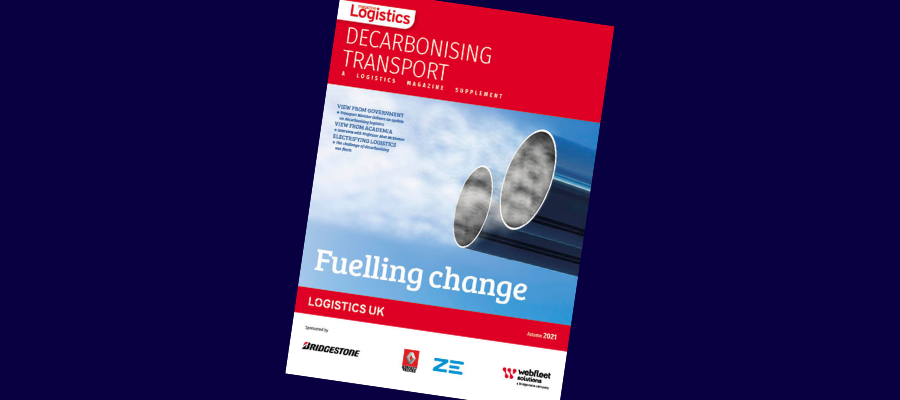🕒 Article read time: 2 minutes
New supplement captures the current thinking on decarbonising logistics

A soon-to-be published Logistics Magazine supplement reflecting on the government’s recently published Transport Decarbonisation Plan, captures the current thinking on both the “mammoth challenge and enormous opportunity” that decarbonisation promises to deliver for the industry, David Wells, Logistics UK’s Chief Executive, has said.
In his introduction to the supplement, sponsored by Bridgestone, Renault Trucks and Webfleet Solutions, Wells said that the government’s plan “takes a long view, offering a route map on the steps that must be taken for both passengers and freight transport to decarbonise and achieve net zero emissions by 2050.
VIEW FROM GOVERNMENT
In an exclusive opinion piece within the supplement, Transport Minister Rachel Maclean MP describes the plan as “the biggest piece of work we have ever done to tackle the damaging greenhouse gas emissions emitted from transport”, and states that “freight is a vital part of the solution to this significant challenge that impacts us all.”
PLOTTING THE ROUTE TO NET ZERO
Logistics UK’s decarbonisation lead, Michelle Gardner, talks about the business group’s work with its members, the government and policymakers to help make the net zero emissions goal a reality. “We know the pathway to Net Zero will be challenging for many of our members, as the technology solutions are still being developed,” she said, “but we will ensure our work in this space is meaningful and can be translated into real action and tangible results.”
VIEW FROM ACADEMIA
A more critical view of the government’s plan is offered via an exclusive interview with Professor Alan McKinnon of Kuehne Logistics University. McKinnon argues that the plan lacks clear targets, a clear indication of how the government plans to cut logistics emissions over the next 15 years and a general sense of urgency.
“Everybody in the climate change world now accepts the next ten years will be critical,” he said, “Globally we’ve got to get our CO2 emissions down by 7.6% per annum over the next ten years to achieve that. Therefore, we have to act very quickly.”
REVIEW OF ALTERNATIVELY FUELLED VEHICLES
Independent automotive consultant Martin Flach reviews the alternatively fuelled trucks and vans currently on the market. He looks at all the options for the various weight segments, from the LCVs to heavy trucks, and the different types of fuel, from natural gas to hydrogen.
“I am optimistic that battery electric solutions are available for the distribution market,” he said, but warned “For long-distance, we still have a lack of viable solutions.”
The Logistics Magazine Decarbonising Transport supplement is scheduled to be published in early September.
*www.logistics.org.uk/LMag
Published On: 19/08/2021 16:00:52

Comments Section
If you are a Logistics UK member login to add comments.